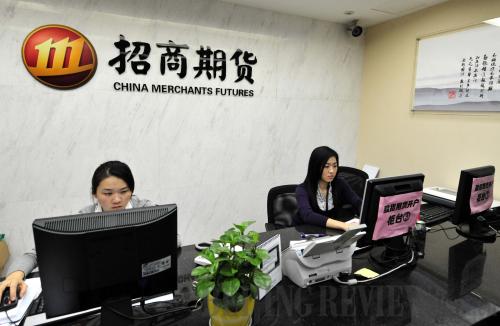|
 |
| THE FUTURE OF FUTURES: The Office of China Merchants Futures, April 8, 2010. The Chinese mainland officially started trading stock index futures on April 16 in an effort to provide investors with a healthy investment market (XINHUA) |
China will allow foreign businesses to invest in stock index futures under the prudent supervision of Chinese regulations, which was disclosed during the second round of the China-U.S. Strategic and Economic Dialogue (S&ED) from May 24 to 25.
"China's regulatory watchdog will establish rules for qualified foreign institutional investors (QFII) to invest in stock index futures," said Liu Xinhua, vice chairman of China's Securities Regulatory Commission (CSRC).
Some economists worry that QFII investment in the stock index futures market will put the A-share markets in danger. Larry Hsien Ping Lang, chair professor of finance at the Chinese University of Hong Kong, says that a crisis is coming.
"China will only be half a step away from the situation before Japan's big recession once foreign securities companies are allowed to become members of the trading bourse in China," Lang said in his recent articles.
Is Lang exaggerating? National Economic Daily asked some experts to share their views.
Related reading: Lessons From Japan
Larry Hsien Ping Lang: Approaching a crisis
Lang's alarming point of view is based on his research on the huge disaster that struck Japan's share market in the 1990s, when the Nikkei index nosedived from its peak at 38,957 in December 1989 to 19,781 in October 1990. Twenty years later, the stock market in Japan still hasn't returned to where it was.
Lang said in an article in May 7 that the stock crisis in Japan occurred in three steps that were taken intentionally by the Americans. First, investment banks from the United States made money by taking advantage of stock index futures as well as stock index options. Simply put, American investment banks gained a large amount in commission fees by hedging risks: Japanese insurance companies expected the stock market to rise, but global funds companies invested in the market expecting stock values to decline.
Second, Japan launched a margin trading and short selling program in 1987, which meant that fund traders were able to borrow stocks from securities companies and then sell those stocks. If all traders did this, the stocks would drop sharply.
Finally, foreign investment banks received membership in the Tokyo Stock Exchange in1987, qualifying them to operate in the margin trading and short selling business, and were able to beat the Japanese stock market. As Japan's stock market was full of bubbles prior to the 1990s, foreign securities traders earned a lot by selling securities. With the collapse of the Japanese stock index, American investors made a fortune by buying put options and short selling index futures.
Compared with the three steps taken in Japan, China has already completed the first two steps: First, it launched a margin trading and short selling program on March 31 this year, allowing securities companies to lend stocks and money to investors for stock trading. Second, China officially started trading stock index futures on April 16. "Although we do not allow foreign securities companies to become members of stock exchanges, we are quite close to the situation in Japan prior to its recession," Lang warned. "Is China going to follow Japan's suit? Take care."
Andy Xie: No significant impact
While Lang worries that the Chinese economy will soon face a crisis, Andy Xie, a renowned independent Shanghai-based economist, disagrees. "Foreign investment in the stock index futures business will have no effect on the Chinese market," he told National Business Daily recently. "Exaggerating the foreign impact on stock index futures is just a concept of speculation."
There is no definite date for foreign investors to enter the stock index futures market, which is expected to be a long process, said Xie, who is also the former Morgan Stanley chief economist for Asia. China will not easily be affected by foreign businesses in terms of value, investment notions and financial markets, he added.
By the end of March 2010, the State Administration of Foreign Exchange had approved a total of 88 QFII businesses, with an approved rate valued at $17.07 billion. Statistics from the People's Bank of China, the central bank, show that these QFII businesses have total assets of $289.9 billion, 82 percent of them securities assets. They held only 1.4 percent of circulation market value in the A-share market by the end of 2009.
| 